
Blog
What Is Recurring Revenue and Why Does Your Business Need It?
November 22, 2023


Key Insights
Every person who enters entrepreneurship is striving for business development.
Building a structure and system, streamlining operations, ensuring a steady source of income, and establishing a foundation for steady growth and success are the primary steps toward stabilizing your business.
However, the major part of developing your business comes with consistent cash flow and profit. One way companies can ensure this is through recurring revenue.
In this article, we will explore recurring revenue, its types, its importance, and its benefits in helping your business grow.
So scroll down.
What is Recurring Revenue?
Recurring revenue refers to the consistent and predictable stream of income that a business receives at regular intervals from its customers or clients. This revenue model provides businesses with financial stability and the ability to forecast future income more accurately.
Companies that successfully implement recurring revenue models often benefit from increased customer loyalty, as customers commit to regular payments in exchange for ongoing access to products or services.
Recurring revenue examples include subscription services, monthly memberships, and maintenance contracts.
Types of Recurring Revenue
Some of the recurring revenue types include:

- Subscription Revenue
This model involves customers paying a regular fee at scheduled intervals, typically monthly or annually, in exchange for continued access to a product or service. Examples include subscription-based streaming services, software-as-a-service (SaaS), and subscription boxes.
- Service Contracts
Businesses can secure recurring revenue by offering ongoing services through contractual agreements. This can include maintenance contracts, support services, or consulting agreements where customers pay a recurring fee for continued assistance and support.
- License Fees
Some businesses generate recurring revenue through licensing agreements. This model involves customers paying regular fees for the right to use a particular product, technology, or intellectual property. A common example of a license fee is Software licensing.
Additionally, effective revenue attribution strategies help businesses track and allocate income accurately, providing insights into the specific sources and channels contributing to the success of their licensing-based recurring revenue model.
- Freemium Models
Freemium models offer a basic version of a product or service for free while charging customers for premium features or additional functionality. The recurring revenue comes from customers choosing to upgrade to a paid plan to access enhanced capabilities.
- Usage-Based Pricing
In this model, customers are charged based on their usage or consumption of a product or service, often requiring careful customer engagement planning. This is common in industries like cloud computing, where customers are charged saas usage-based pricing for the resources they use, such as storage, data transfer, or computing power, on an ongoing basis.
Hence, the type of recurring revenue varies depending on the product or service, industry, and market that you cater to.
Why is recurring revenue important?
Applying the recurring revenue formula provides several advantages to your business starting from financial stability, and strategic advantages to the ability to foster long-term customer relationships.
Firstly, it offers a predictable and consistent cash flow which enhances your financial planning and reduces the uncertainty associated with one-time transactions. This predictability thus helps with budgeting, resource allocation, and overall business sustainability.
Secondly, recurring revenue models contribute to customer loyalty. When customers subscribe to ongoing services or products, businesses have the opportunity to build lasting relationships, increasing customer retention rates. This loyalty not only ensures a steady revenue stream but also creates brand advocates who are likely to recommend the product or service to others.
Recurring revenue boosts a business's value, making it more appealing to investors. Investors like businesses with a steady and scalable income, seeing it as a sign of a healthier and more sustainable operation.
Furthermore, leveraging revenue intelligence tools enables businesses to analyze and interpret data, gaining valuable insights into customer behavior and market trends, ultimately optimizing their strategies to enhance the attractiveness of their recurring revenue model to potential investors.
In today's business world, where customer engagement is crucial for staying ahead, recurring revenue models help businesses adapt, innovate, and concentrate on providing consistent value to customers.
What are the benefits of recurring revenue?
Recurring revenue offers numerous benefits to businesses, contributing to financial stability, customer relationships, and overall business success. Let's look into more benefits that recurring revenue opens to businesses.
Additionally, implementing effective revenue strategy examples, such as tiered subscription models or loyalty programs, can further enhance the predictability and sustainability of recurring revenue streams.

- Predictable Cash Flow
Recurring revenue provides a steady and predictable source of income, making it easier for businesses to plan budgets, allocate resources, and manage expenses. This stability enhances financial predictability and reduces the impact of seasonal fluctuations.
- Customer Retention and Loyalty
Subscription-based models and recurring revenue strategies foster long-term relationships with customers. Continuous engagement and regular interactions build customer loyalty, increasing the likelihood of retention and reducing customer churn.
- Enhanced Valuation
Businesses with recurring revenue models are often valued more highly by investors. The predictability and sustainability of income make the business more attractive and reduce risk, potentially leading to higher valuations during acquisitions. Implementing an online forecasting calculator can further fortify the assessment of recurring revenue, providing a data-driven tool to enhance predictability and support strategic decision-making.
- Flexibility for Innovation
With a stable revenue stream, businesses, especially those collaborating with an iOS app development company in Dubai, have the flexibility to invest in innovation, research, and development. This allows them to stay competitive by adapting to market changes, improving products or services, and meeting evolving customer needs.
- Cost-Efficiency
Acquiring new customers can be more expensive than retaining existing ones. Recurring revenue models often result in lower customer acquisition costs, as businesses can focus on maximizing the value of their existing customer base.

- Customer Lifetime Value Growth
Recurring revenue models contribute to the growth of customer lifetime value by extending the duration of customer relationships. This extended customer lifespan allows businesses to capture more value over time, exceeding the revenue generated from nonrecurring revenue transactions.
- Operational Efficiency
Knowing that revenue is likely to continue over the long term, businesses can optimize operations and streamline processes. This efficiency can lead to cost savings and improve the overall business performance.
Additionally, distinguishing between revenue operations and sales operations becomes crucial for aligning strategies, as revenue operations focus on end-to-end customer engagement and satisfaction, while sales operations specifically target the sales process, combining efforts to enhance overall organizational effectiveness.
Recurring revenue businesses have the financial security, loyal customer relationships, and ensured sustained growth and success in a dynamic market environment.
Final Thought
Businesses are constantly striving to attain stability to ensure sustained growth. A crucial way of achieving this stability is by understanding the product or service you offer and the market you cater to.
Aligning your operational strategies with these insights helps businesses establish consistent growth and maintain a steady cash flow.
Recurring revenue helps businesses achieve long-term success by building customer loyalty, maintaining financial resilience, and positioning themselves as robust and attractive investments.
The predictability and sustainability it offers make the company an attractive investment opportunity. Incorporating recurring revenue models positions businesses not only for financial stability, but also for the flexibility to adapt, innovate, and consistently deliver value to customers, thereby ensuring success in a dynamic business landscape.
For more sales and business-related topics, connect with Kennect. For more information, Book A Demo Now!
ReKennect : Stay ahead of the curve!
Subscribe to our bi-weekly newsletter packed with latest trends and insights on incentives.
Thank you! Your submission has been received!
Oops! Something went wrong while submitting the form.
Your data is in safe hands. Check out our Privacy policy for more info














